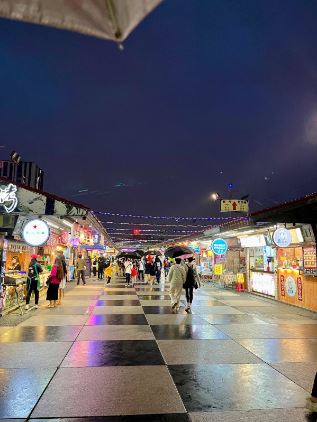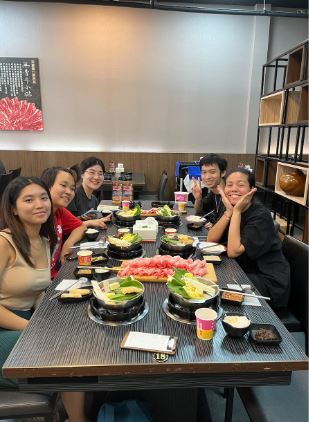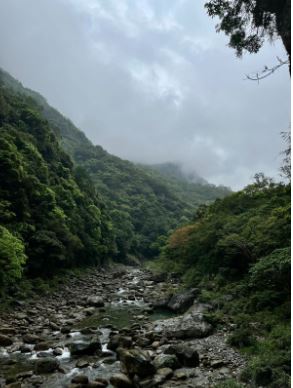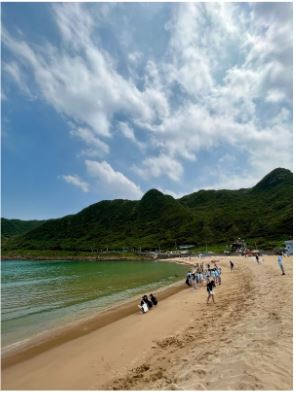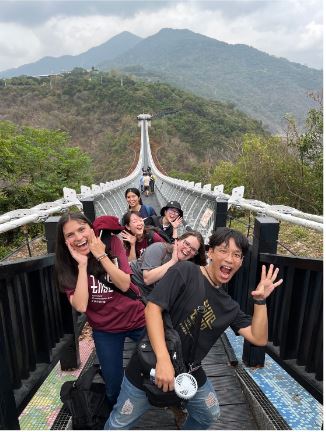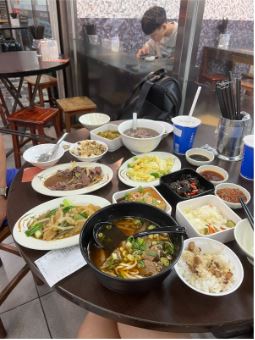Document Actions
Michelle Yu
Studying in Taiwan
By Michelle Yu
(Attended in Spring 2023)
I landed in Taipei on a late March night. Exhausted from traveling for the past sixteen hours with two heavy suitcases in tow, I dreaded having to find my way home. However, I soon realized the transit system was shockingly intuitive — and English was everywhere: from the signs to the ticket machines to even the train announcer. Within a few minutes, I’d already found my way and settled in for my two-hour journey from Taipei to Kaohsiung. As the train started moving, I watched the trees and buildings zoom by outside my window, and the landscape of Taiwan unfolded before me. I felt myself smiling — my journey was finally starting.
The following few weeks were a blur of meeting new people and exploring the city. At first, I was embarrassed that I couldn’t speak Chinese fluently, but locals and service workers are incredibly helpful and patient. They never made me feel uncomfortable or dumb, and some of them were even curious about where I’m from and why I was in Kaohsiung. Over time, I learned to overcome that embarrassment and not be afraid to speak up. Even with that aside, Taiwan’s bigger cities that see a lot of tourism (like Taipei, Kaohsiung, even Tainan) are very accessible as an English speaker. A lot of restaurant menus, street signs, public transit, etc. are offered bilingually.
Speaking as a woman raised in New York, my biggest culture shock might have been how safe Taiwan is. Generally speaking, crime rates are very low, and I’ve never felt uncomfortable walking alone or late at night.
Student and Work Life
As a Huayu Scholarship recipient, you have two obligations. The first is your classes, which run Monday through Friday, three hours a day. I found my class to be rather easy and the pacing was slow for my taste, but my instructors were funny and kept me engaged. The class sizes are small, and much of it is participation-based, so you’ll really get to know your fellow classmates. The foreign student population at Wenzao is quite diverse, with students from various parts of Asia, some from Europe, a few from Hispanic countries. My class got along well, and we’d go for lunch after class or study together.
The second obligation you have is teaching elementary school students English. This is a three hour weekly commitment, and you will be paid monthly in cash. Getting to experience the Taiwanese education system helped me understand the culture as a whole better, and it was overall a valuable and fulfilling experience. I grew fond of my students and was sad to be saying goodbye to them.
Fun and Travel
Naturally, much of the joy of studying abroad is outside of the classroom. Class isn’t too demanding, so it leaves a lot of time to explore and practice your Chinese. There’s plenty of shopping around, good food and markets, and KTV is a big thing there if you like karaoke. The Chinese Learning Center (CLC) holds a lot of activities that are usually free or low-cost, and they’re a great way to learn more about the culture and meet other students. Some of these are hosted within the school (e.g. a lecture about Bangzi opera, a paper-cutting activity) or outside.
If you have a bit of money to spare, I highly recommend traveling to other parts of the island. Taiwan is small, but it’s packed with such a diverse population, and each part of the island offers a unique lifestyle and beauty. Here are just a few of my highlights around the island:
Hiking in Taroko Gorge.
It was easily accessible by bus, and the view of the mountains was just breathtaking. Halfway through my trail, there was a stopping place with cold drinks and Taiwanese style sausages.
Dawulun Beach in Keelung.
This beach is a bit more out of the way, but very quiet and beautiful. You could rent paddle boards or floaties nearby for cheap, or just swim, relax on the sand, and people watch.
Sandimen Township.
This trip was an activity hosted by the CLC. Sandimen is an indigenous township where we attended a dance performance, hiked a bit through the mountains, went to a bead-making workshop, and ate indigenous food.
Food and Drink!
One of my favorite aspects of Taiwan is the food and drink. I love night markets because you can get cheap snacks from a stall and eat while you stroll around and find something else that catches your eye. You can also buy clothes and souvenirs here or play games. Convenience stores are legitimately everywhere in Taiwan, and they’re open 24/7, so you’ll always be able to get a late night snack or drink. Drinks are also a big part of the everyday life of Taiwan. There are little shops everywhere with lots of different types of bubble tea and coffee, and people are always walking around with a drink in hand.
Cost of Living
The Huayu Scholarship offers a 15,000NTD monthly stipend. From teaching you’ll also earn about 1,000NTD a week. You’ll pick this all up in cash at the office on campus every month. I’d say that discounting rent and extraneous spending, this is enough to live on comfortably — food, travel, other daily expenses. If you plan to travel or go shopping a bit more, I’d be sure to bring some extra cash.
Compared to New York, the COL is much lower, and daily expenses are much more affordable in Taiwan. Local transit will cost you at most 1 USD per ride. A coffee will cost you around 2-5 USD, and eating out will cost less than 10 USD a meal. For minor issues, the medical system is also very affordable and efficient — I saw the eye doctor and was prescribed medicine, and the whole experience spent less than 30 USD.
Reflection
From the big city experience to nature, Taiwan honestly has a little bit of everything. And even better — it’s all very accessible. It’s easy to make friends as a student, and outside of that, you’ll constantly be surrounded by people who are happy to help. As with all new experiences, travel is what you make of it. For me, experiencing the Taiwanese way of living refreshed my perspective on life and what I want to make of it. With such a diverse population, friendly people, and good food everywhere, I believe everyone will have something to gain from Taiwan.

